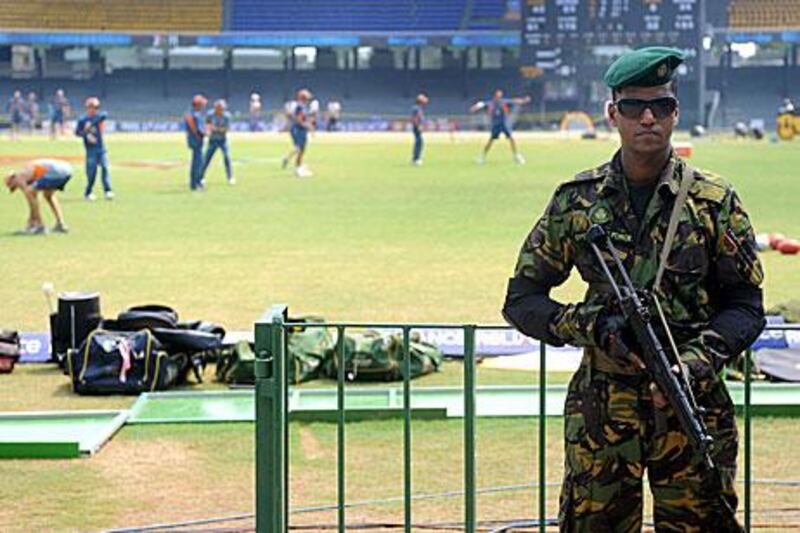It is big-match season in Sri Lanka, a time when traditional rivals do battle on the cricket field, and old friends renew acquaintances beyond the boundary.
Ten leading schools in Sri Lanka take turns to play their historical adversaries, in a series of two-day fixtures at Colombo's Test ground, the Sinhalese Sports Club (SSC). The matches mark the highlight of the social calendar for each school's alumni.
This weekend is the 82nd meeting of Ananda and Alanda, two of the country's leading Buddhist schools, each of which has a pedigree for breeding future international cricketers.
________________________________________________
More
• West Indies make merry at World Cup as Bangladesh implode at home
• Points table
• New Zealand boost World Cup chances with clinical win over Zimbabwe
________________________________________________
The organisers of the "Battle of the Maroons" - Alanda was initially formed as an offshoot of Ananda, and as a sign of their shared heritage players from both Ananda and Alanda wear maroon caps - have made one break with tradition for this year's match.
In a nod to the other sporting event which might expect to steal some of their limelight, they have erected a giant screen at the ground to keep the spectators updated on the World Cup tie between Sri Lanka and Australia.
Australia trained at the SSC earlier this week. As a marker of just how important schools cricket is viewed in this country, the world champions then had to make alternative training arrangements once the schoolboys moved in.
It is fitting that Sri Lanka will be hosting Australia for the first time in a World Cup match while the maroons match is going on just across the city.
Alanda is the alma mater of Arjuna Ranatunga, a storied former pupil whose life post-academia is intrinsically linked to Australia.
It was an incensed Ranatunga who led the Sri Lankans from the field when Darrell Hair, the equally issues-rich umpire, no-balled Muttiah Muralitharan for throwing in the Boxing Day Test of 1995 in Melbourne.
The burly captain emerged in credit from the firestorm that incident created. Sri Lanka had until then been regarded as the acquiescent, easy-beats of international cricket.
This is regarded as the point when that attitude changed, as Ranatunga steeled a side which would soon become world champions, beating Australia on the way to winning the 1996 World Cup.
That remains the only time Australia have been beaten by Sri Lanka in seven World Cup encounters.
However, statistics will say whatever you want if you torture them long enough, and Sri Lanka might point to the fact they have a 100 per cent record against the Australians in World Cups in Asia.
Today's meeting between the sides at the R Premadasa Stadium is a rematch of the 2007 final in Barbados. Australia won that day, and have four wins over their hosts in the past two World Cups.
"The bottom line is, number one, that they have been a very good side," Kumar Sangakkara, Sri Lanka's current captain, who played in all four defeats, said yesterday.
"Secondly, I don't think that the belief was as strong at that particular time about beating Australia.
"Even when we went to Australia on our last tour, the key changes we made were basically mental, and in terms of attitude and the way we looked at beating the Aussies. We had to enjoy the challenges and make sure than every member of the squad believed from day one that we were there to beat them.
"I think those kind of changes have been much more important for us than technical changes."
Sangakkara's approach to toppling the holders today is less a Ranatunga-style call to arms, more a calculated analysis.
"Rather than worrying about the outcome of the game, I think it is more important we concentrate on the little processes, like building partnerships and making sure whoever gets in with the bat makes big runs," he said.
"The real strength for Australia is their pace attack. They have four quality pace bowlers, three of whom are pretty quick.
"They will come at us pretty hard from ball one, so if we can absorb that pressure and try and be as positive as we can, maybe there will be an opportunity to capitalise on the spin."
It is a week since Australia last played a match, and their captain, Ricky Ponting, admits his side have not known what to do with such an unusually lengthy break.
"If you try to stay 100 per cent committed and focused all the way through, then by the time game day comes around the last thing you want to do is play cricket," he said.






